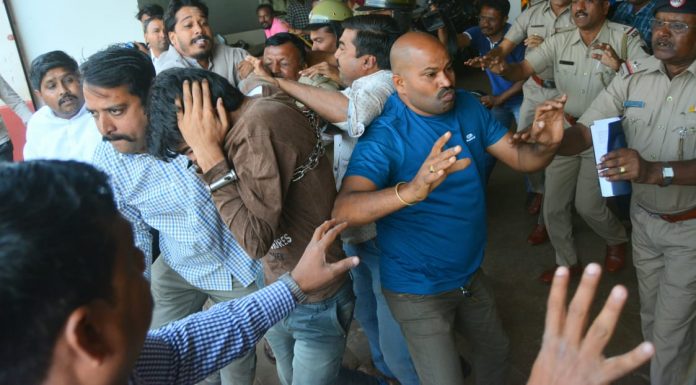Basit Ashiq Sofi, Talib Majeed and Aamir Mohiuddin Wani, all from Kashmir and students of civil engineering at a college in Hubli, were taken into custody on February 17 for allegedly chanting pro-Pakistan slogans in their campus hostel on the occasion of the first anniversary of the Pulwama suicide bomb attack three days earlier. According to the prosecution, they were booked on the basis of a video clip that showed them chanting “Pakistan zindabad” while a Pakistani patriotic song is heard in the background.
The same evening, the Hubli Bar Association passed a resolution to the effect that not only would no local lawyer take up their cases, they would not allow anyone from outside to legally represent the three Kashmiri students. As if to prove they were true to their word, lawyers in the city, dressed in black coats and black pants, stood outside the Hubli court to stop any legal support reaching the students. The bar association and lawyers from the district court continued to block representation for the students despite a petition filed before the Karnataka High Court.
On February 26, the Karnataka High Court’s division bench of Chief Justice Abhay Shreeniwas Oka and Justice Hemant Chandangoudar called the bar association’s behaviour “sheer militancy”. Acting on a petition filed by two dozen advocates from all over the state challenging the Hubli Bar Association, the bench observed that passing such resolutions would affect the image of the entire judiciary.
It said: “What will be the image of the institution of judiciary? We say we don’t hold kangaroo courts. Even Ajmal Kasab was given a full trial. The Supreme Court had appointed senior advocates to represent him in his case.”
The Court stated: “Let the advocates file the bail applications under police protection and then we may transfer the case to Bengaluru. Today it is about these three accused, tomorrow the Bar will pass similar resolution in some other case. You (Advocate General) impress upon them (Hubli Bar Association). We will ensure that cases are transferred out of their jurisdiction.”
On this, Advocate General Prabhuling Navadgi submitted: “I have spoken to the President of the Hubli Bar Association and they are willing to reconsider the resolution passed by them.”
The Court noted that the police had done an excellent job in providing protection to the advocates who wished to file bail applications for the accused persons in the lower court.
On February 27, the Court ordered the Hubli Police Commissioner to ensure “complete police protection” for those advocates who wished to represent the three Kashmiri students. Chief Justice Oka had remarked: “How can the Bar Association pass such a resolution? This is obstruction of court work. Are they carrying out a mini-trial by themselves?”
Three days earlier, when advocate Maitreyi Krishnan and others visited the district court in Dharwad to file the bail applications, they had to face stiff opposition from the members of the Hubli Bar. They were disrupted by the local advocates and had to return without filing the bail applications.
But the harsh words from the High Court bench and the tough stance taken by the senior lawyers from around the state saw the Hubli Bar Association on February 27 withdrawing its earlier resolution.
“Advocates who wish to appear for the accused can approach Dharwad District Court to file bail plea for them,” said the Association.
On February 28, after almost four days of struggle, a team of advocates from Bengaluru was finally able to file the bail applications before the Principal District and Sessions Court in Dharwad for the three Kashmiri students charged with sedition, amid police protection. Police took precautionary steps to see the advocates were not hindered in their efforts in filing the applications. Subsequently, at the bail hearing on March 2, the judicial custody of the accused was extended till March 7 by a Hubli court.
This case in Hubli isn’t an isolated event. In January, the Mysuru Bar Association announced that that none of its members would appear for Nalini Balakumar, a student who was booked on sedition charges for holding a “Free Kashmir” placard during a protest at the University of Mysore.
Soon, support began pouring in for her from several quarters. In a statement, senior advocates from across the state said that they were ready to represent Balakumar and other students booked in the case, and help them by providing the necessary legal assistance.
Offering to appear in court to represent Balakumar and the others who were booked under IPC sections 34 and 124A (sedition), the advocates stated: “Every person has the fundamental and constitutional right to be represented in a court of law.”
“As senior advocates, we are ready to represent the accused in court and provide her all the necessary legal assistance. So, students are requested not to worry and concentrate on their academics,” the statement said.
A group of advocates from Bengaluru issued a statement calling the Mysuru Bar Association’s decision a blatant attack on the ideals of the Constitution.
It is the increasing incidence of such events that prompted Supreme Court judge Justice Deepak Gupta to recently criticise the trend of Bar Associations passing such resolutions.
Speaking at a function in New Delhi, Justice Gupta said: “I see many bar association resolutions that they will not appear for such and such cases, saying the act is anti-national. It is wrong. When bar associations say something like that (won’t appear for certain people), that is obstruction of justice,” he said. Nothing could be truer.
Lead picture: Twitter


